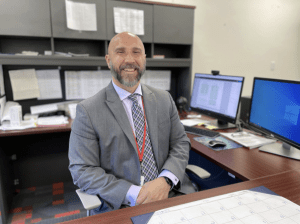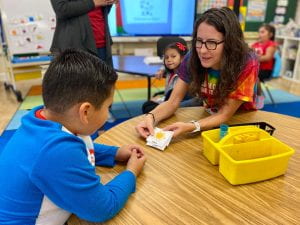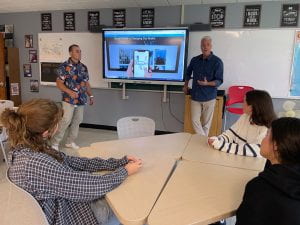

Over the past three months in my new role, I’ve worked to immerse myself in everything related to Curriculum, Instruction, and Professional Development in our school district. While some things are very familiar to me, especially when related to high school, others will be brand new to me. Learning more about our district from a K-12 perspective has been very exciting and I would like to invite you to join me on this journey. Each month, I will share an overview of a specific area of our curriculum to help each of you get a better sense of this work as well.
For this first edition, I decided to look into the great work that our faculty members and administrators do during the summer to develop and revise curriculum. While the summer is a great time for our faculty to rest and recharge, most of them spend a significant amount of time revising lessons, learning new strategies, collaborating with each other and attending summer workshops or conferences. Some participate in these activities on their own while others participate in formal projects through our district. These formal projects will be the focus of this overview. These projects are budgeted for as part of our budget process and must be approved by both the building principal and my office in advance.
So…Why Revise Curriculum?
One major reason for curriculum projects is when an administrator, faculty member or group of faculty members identify an area that they would like to enhance or revise.
This past summer Randi Nerkizian and Tennille Marino worked together to enhance the lessons that classroom teachers use as part of William O. Schaefer Elementary School’s Character Education program. “We focused on streamlining our resources so that staff members have practical, relevant activities to use during Morning Meeting and throughout the day. We returned to specific words of the month rather than themes to support our youngest learners as they learn what our core values are as a school and community, how to express themselves and how to interact with one another. We also looked at ways to infuse school and community events (such as student elections and community food drives) with our curriculum to provide concrete, ‘real life’ experiences for our students,” Nerkizan shared.

Connected to this work was a summer project taken on by WOS English as a New Language teachers Elizabeth Apicella and Jessica Yapkowitz who revised and developed lessons and resources that ENL teachers and classroom teachers can use to support English Language Learners who are new to our country.

At Tappan Zee High School, social studies teachers Greg Laskow and Scott Silver collaborated on two projects to incorporate current issues into existing courses. They worked on lessons and unit plans in their psychology courses to provide opportunities for students to learn how Artificial Intelligence (AI) could impact their own learning while also exploring questions about what role AI could play in the mental health field and in the study of history. Additionally, Silver and Laskow took another very relevant topic, social media, and developed new lessons for both their psychology and history courses. They developed a project that will be implemented in their psychology classes that will ask students to research the connection between social media use and anxiety and depression. While changes like the above are examples of faculty members being reflective and assessing what is needed in their classes, there are other times when teachers are responding to curricular changes at the state level.
Whenever the New York State Education Department (NYSED) issues new standards or makes adjustments to existing ones, districts must review those standards and align our local curricula with the expectations of NYSED. Examples of this occurred at both the elementary and secondary levels in regards to the gradual rollout of new Science standards and assessments.
At Cottage Lane Elementary School, K-8 Science Instructional Coach Samantha Levine led a group of teachers including Pamela Cooper, Ciara Fodi and Jaime Tan in a revision of a fifth grade unit on matter that had been developed a few years back when the team initially aligned our curriculum with the standards. The team wanted to further adjust and revise the unit to give students the opportunity to apply what they were learning in a fun, relatable way. They also worked on a state-mandated investigation activity and incorporated new questions that will prepare students for the state assessment.
At the high school, New York State Master Teacher Dr. Steve Cohn spent part of his summer aligning our Earth Science curriculum with new state standards as well. “Over the last few years, New York State has been working on rolling out new science standards for all grades. These changes are being implemented at different grade levels over the course of the next few years (some grades have already changed over). These new standards are changing how teachers teach and students learn. They emphasize engaging students as scientists. Often, a unit will begin with some phenomena (the big idea). The students then take part in numerous inquiry-based activities to learn relevant information to come up with the explanation of why or how the phenomena occurred,” said Dr. Cohn.
Another example of meeting the expectations of a new state initiative is the work that TZHS social studies teacher, Christine Drivas undertook to align our work with NYSED’s Seal of Civic Readiness. Eligible students must demonstrate that they are proficient in specific skills, knowledge, mindsets, and experiences related to civics through the development of a portfolio. Drivas, who will oversee the implementation of the Seal, created resources for students who want to pursue it, along with guidance for portfolio development.
Finally, other Summer 2023 curriculum projects focused on how we communicate with our students and their families.
At CLE, Technology teacher Jacob Tanenbaum created a series of informational newsletters about social media and technology use among children with practical tips and resources for parents to use at home with their children. These will be shared by Principal Scarth throughout the year with the Cottage Lane community.

At WOS, reading teachers Bridget Incognoli, Elizabeth Barsanti, Kerri Goldstein and Kristina Ippolito created new progress reports for parents of students who are receiving Response to Intervention (RTI) services. The team at WOS spent a lot of time and energy evaluating and adjusting their RTI process this year and wanted the progress reports to reflect those changes. Finally, at SOMS, Math teachers Jennifer Abrahamsen and Kayleigh Mendez spent time evaluating their grading policies while looking for ways to provide feedback to students, be more equitable in how they grade students and, most importantly, use their grading practices to help students use it as feedback while developing a growth mindset. They will be piloting some of the new practices this year in their courses.
These projects are just a small portion of the great work that happened over the summer as teachers, counselors, instructional coaches, and administrators worked on curriculum and professional development to get ready for the school year. In total, more than one-third of our instructional staff worked on at least one project. I am excited to follow up on the implementation of these projects throughout the year.